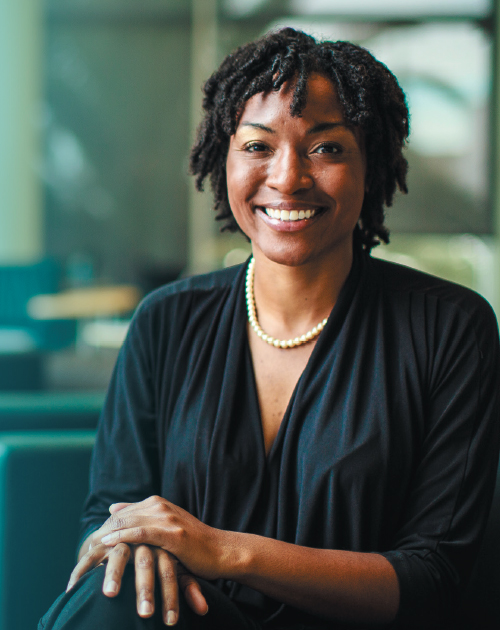Christian ministries alumna founds advocacy organization in Minneapolis
A life’s work

Once a Messiah student, Jeanelle Austin ’07, founder of the Racial Agency Initiative (RAI), returned to campus as an alumna to deliver the sermon “And Your Daughters Will Be Well” at chapel in January. She knows what it’s like to sit in Brubaker Auditorium and hear a profound message.
“These students are really thirsty for help. Just looking at the eyes of people I was talking to, some were lighting up, some looked like they needed help, some people looked discouraged. I saw a lot of people who were in need for an open door, an open pathway, to lean into a kind of conversation that they’re not privy to at Messiah,” she said after the chapel service.
After graduating from Messiah with a degree in Christian ministries, she went on to study and work at Fuller Theological Seminary for nearly 11 years, completing an M.A. in intercultural studies and later a Master of Divinity in Christian ethics. She worked a variety of positions at Fuller, including an academic advisor, advising service coordinator and director of operations for the Pannell Center for African American Church Studies.
“A lot of the work I did at Messiah was deeply rooted around racial justice and race conversations and really facilitating opportunities for people to think critically about the status of race in our society,” she said. “My time at Messiah gave me a platform to begin developing what would grow into the work that I do today.”
Finding her way
After working in Christian academia, in 2019 she founded RAI, an organization based in Minneapolis that seeks to provide people with the tools to pursue racial justice.
“I decided that if I was going to launch a consulting firm, it had to be around a pursuit of racial justice that wouldn’t lead to burnout quickly and so RAI came about with this idea about pursuing racial justice with joy,” she said. “How do we help people understand that racial justice is not about marching down the streets? Racial justice is a way of life that needs to be practiced.”

She uses Clifton Strength Assessments with her clients to help them think about how their environment can influence their advocacy. “I am a firm believer that everything we experience in our life shapes our worldview. Our worldview begins to shape the moment we are born and how we’re shaped in the context of our family and schools you go to, kindergarten on up,” she said.
She says there is no one-size-fits-all book that people can follow to achieve racial justice. “It’s creating an imagination as to how to approach things differently than how they have been approached before. Sometimes, it takes creativity and giving people access to resources to expand their imagination and their capacity for what this work of racial justice can look like and be for them. Plus, it’s different for everybody depending on where they come from, what their background is, what their experience is and what they need” she said.
Advancing the work
What does racial justice look like for Austin? “Racial justice is about making right the wrong—the harm done on black, brown, indigenous bodies, the land that was stolen, the people that were lynched and murdered and massacred, the children that were abducted, the narratives that were erased, the animals that were killed and destroyed for no reason,” she said.
In addition running RAI, Austin also works as the executive director for the George Floyd Global Memorial, helping to preserve the stories of that event. She also visits classrooms as a guest speaker.
“Racial justice is a way of life,” she said. “Pursuing racial justice with joy is the vision and helping people have an agency for racial justice is the work,” she said.
— Molly McKim ’23